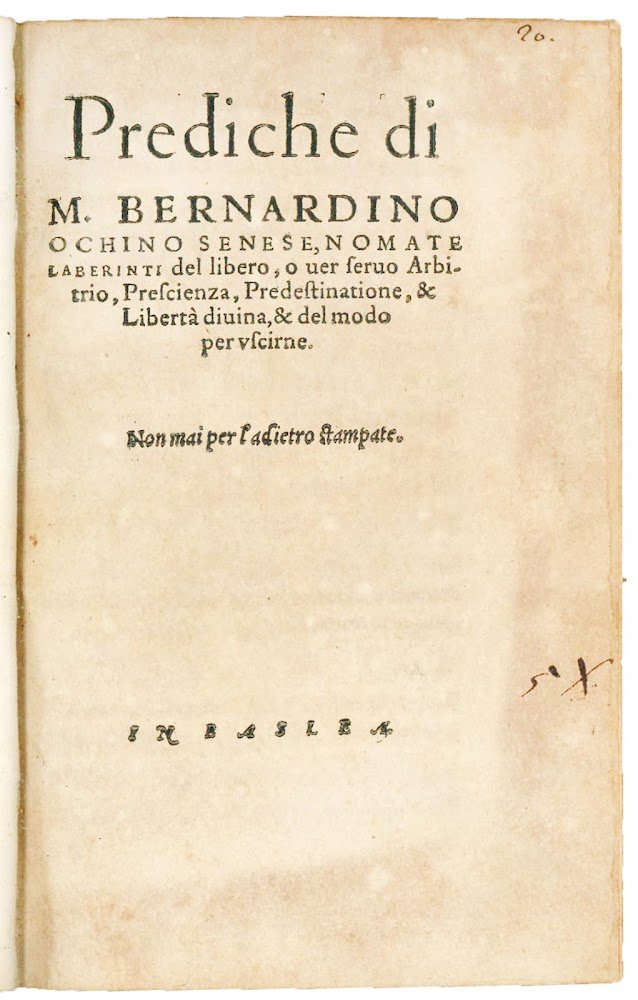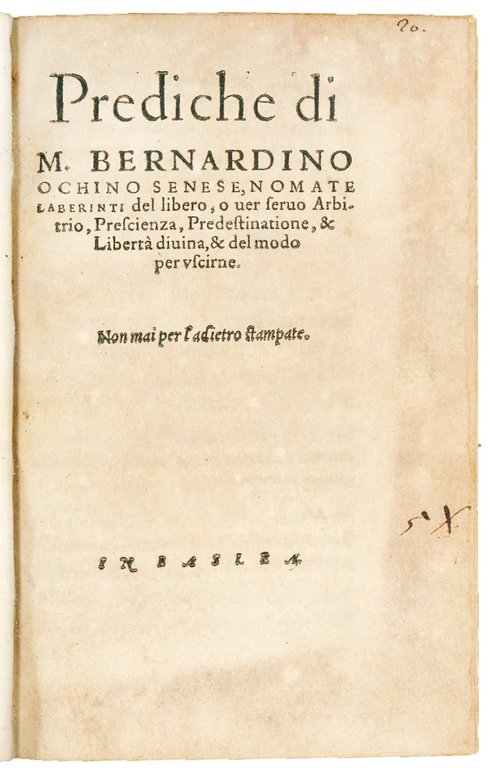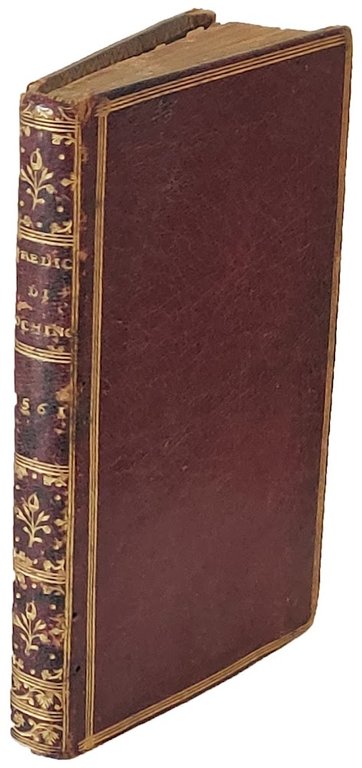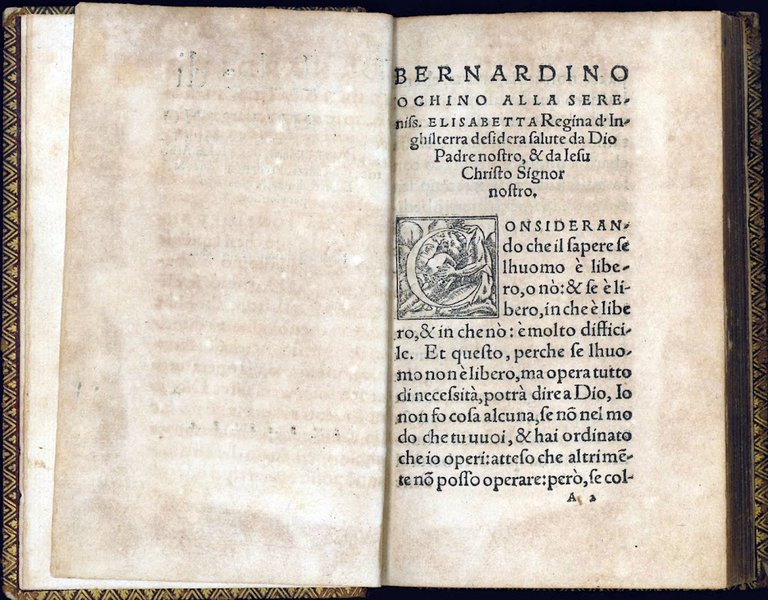Prediche di M. Bernardino Ochino Senese, nomate Laberinti del libero, o ver servo Arbitrio, Prescienza, Predestinatione, & Libertà divina, & del modo per uscirne. Non mai per l'adietro stampate
Prediche di M. Bernardino Ochino Senese, nomate Laberinti del libero, o ver servo Arbitrio, Prescienza, Predestinatione, & Libertà divina, & del modo per uscirne. Non mai per l'adietro stampate | Livres anciens et modernes | OCHINO, Bernardino (1487-1564)
Prediche di M. Bernardino Ochino Senese, nomate Laberinti del libero, o ver servo Arbitrio, Prescienza, Predestinatione, & Libertà divina, & del modo per uscirne. Non mai per l'adietro stampate
Prediche di M. Bernardino Ochino Senese, nomate Laberinti del libero, o ver servo Arbitrio, Prescienza, Predestinatione, & Libertà divina, & del modo per uscirne. Non mai per l'adietro stampate | Livres anciens et modernes | OCHINO, Bernardino (1487-1564)
Mode de Paiement
- PayPal
- Carte bancaire
- Virement bancaire
- Pubblica amministrazione
- Carta del Docente
Détails
- Année
- [1561]
- Lieu d'édition
- Basel
- Auteur
- OCHINO, Bernardino (1487-1564)
- Éditeurs
- [Peter Perna]
- Thème
- Quattro-Cinquecento
- Etat de conservation
- En bonne condition
- Langues
- Italien
- Reliure
- Couverture rigide
- Condition
- Ancien
Description
8vo (151x903 mm). [6], 260 [i.e. 250] pp. Collation: A-Q8. Italic type. 18th-century French red morocco gilt, edges gilt, marbled endleaves (worn and rubbed). Uniformly browned throughout.
First edition, dedicated by the author to Elisabeth I Queen of England, of one of Ochino's most important works published during his years in Zurich, that immediately stirred a polemical reaction from the most intransigent Calvinists such as Théodore de Bèze, who in Ochino's autonomy of thought and individualism felt a threat to the Reformed orthodoxy. In the Prediche nomate Labertinti, discussing the delicate issue of free will, Ochino criticizes both those who held that men act freely and those who held the opposite, and concluded that the only way out of this existential conundrum could be by accepting the Socratic precept “unum scio quod nihil scio” and by preferring the rational analysis to dogmatism. This position inevitably ended up clashing with the increasing confessional hardening of the Zurich religious orthodoxy.
Bernardo Ochino was born at Siena in 1487. At an early age he entered the order of the Observantine Friars, the strictest sect of the Franciscans, and rose to be its general, but, craving a yet stricter rule, transferred himself in 1534 to the newly founded order of Capuchins, of which in 1538 he was elected vicar-general. In 1539, urged by Bembo, he visited Venice and delivered a remarkable course of sermons, showing a decided tendency to the doctrine of justification by faith, which appears still more evidently in his Dialogi VII published soon after. He was suspected and denounced, but nothing ensued until, at the instigation of the austere zealot G.P. Carafa, the Inquisition was established at Rome in June 1542. Ochino was at once cited, but was deterred from presenting himself at Rome by the warnings of Peter Martyr and of Cardinal Contarini, whom he found at Bologna, dying of poison administered by the reactionary party. After some hesitation he escaped across the Alps to Geneva. He was cordially received by Calvin, and within two years published six volumes of Prediche, tracts rather than sermons, explaining and vindicating his change of religion. In 1545 he became minister of the Italian Protestant congregation at Augsburg, which he was compelled to forsake when, in January 1547, the city was occupied by the imperial forces in the Schmalkaldic War. Escaping by way of Strasburg he found an asylum in England, where he was made a prebendary of Canterbury, received a pension from Edward VI's privy purse, and composed his important work, A Trajedy or Dialogue of the unjust usurped Primacy of the Bishop of Rome (1549). The accession of Mary in 1553 drove him from England, and he became pastor of the Italian congregation at Zurich. In 1563 the long-gathering storm of obloquy burst upon the occasion of the publication of his Thirty Dialogues, in one of which his adversaries maintained that he had justified polygamy under color of a pretended refutation. His dialogues on divorce and the Trinity were also obnoxious. Ochino was banished from Zurich, and, after being refused a shelter by other Protestant cities, directed his steps towards Poland, at that time the most tolerant state in Europe. He had not resided there long when the edict of the 6th of August 1564 banished all foreign dissidents. Flying from the country, he encountered the plague at Pinczoff; three of his four children were carried off; and he himself, worn out by age and misfortune, died in solitude and obscurity at Austerlitz, towards the end of 1564 (K. Benrath, Bernardino Ochino von Siena: Ein Beitrag zur Geschichte der Reformation, Niewkoop, 1968, passim; see also R.H. Bainton, Bernardino Ochino. Esule e riformatore senese del Cinquecento 1487-1563, Florence, 1940, passim; and M. Gotor, Ochino, Bernardino, in: “Dizionario Biografico degli Italiani”, vol. 79, 2013, s.v.).
Edit 16, CNCE78656; VD16, O-217; L. Perini, La vita e i tempi di Pietro Pe





